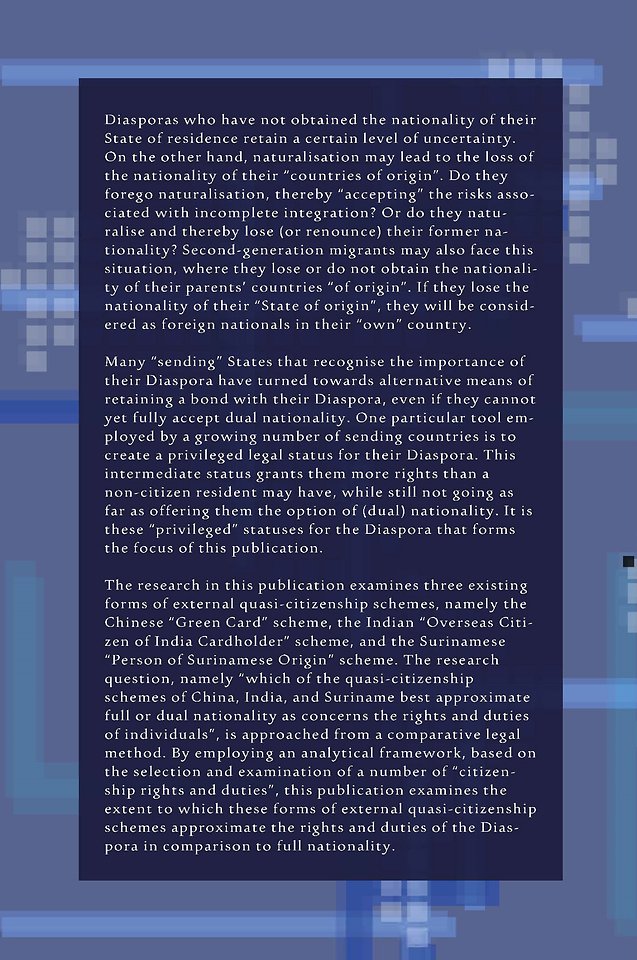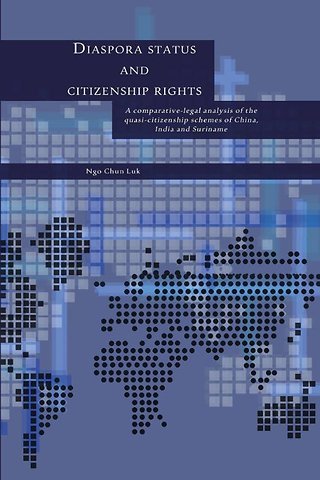Diaspora status and citizenship rights
A comparative-legal analysis of the quasi-citizenship schemes of China, India and Suriname
Samenvatting
Diasporas who have not obtained the nationality of their State of residence retain a certain level of uncertainty. On the other hand, naturalisation may lead to the loss of the nationality of their” countries of origin”. Do they forego naturalisation, thereby “accepting” the risks associated with incomplete integration? Or do they naturalise and thereby lose (or renounce) their former nationality? Second-generation migrants may also face this situation, where they lose or do not obtain the nationality of their parents’ countries “of origin”. If they lose the nationality of their “State of origin”, they will be considered as foreign nationals in their “own” country.
Many “sending” States that recognise the importance of their Diaspora have turned towards alternative means of retaining a bond with their Diaspora, even if they cannot yet fully accept dual nationality. On particular tool employed by a growing number of sending countries is to create a privileged legal status for their Diaspora. This intermediate status grants them more rights than a non-citizen resident may have, while still not going as offering them the option of (dual) nationality. It is these “Privileged” statuses for the Diaspora that forms the focus of this publication.
The research in this publication examines three existing forms of external quasi-citizenship schemes, namely the Chinese “Green Card” scheme, the Indian “Overseas Citizen of India Cardholder” scheme, and the Surinamese “Person of Surinamese Origin” scheme. The research questions, namely which of the quasi-citizenship schemes of China, India and Suriname best approximate full or dual nationality as concerns the rights and duties of individuals, is approached from a comparative legal method. By employing an analytical framework, based on the selection and examination of a number of citizenship rights and duties, this publication examines the extent to which these forms of external quasi-citizenship schemes approximate the rights and duties of the Diaspora in comparison to full nationality.
Specificaties
Inhoudsopgave
Table of Contents ix
List of tables and figures xiv
List of abbreviations xv
List of Latin expressions xviii
Chapter 1.
Introduction 1
Chapter 2:
Nationality and citizenship rights: establishing the benchmarks of quasi-citizenship 29
Chapter 3:
The Chinese Green Card 69
Chapter 4:
India and its Overseas Citizens 133
Chapter 5:
Persons of Surinamese Origin 199
Chapter 6:
Comparing the quasi-citizenship schemes 255
Chapter 7:
Concluding remarks 289
Bibliography 331
Legislative documents 363
Case Law 381
Texts of Key Legislation 387
Summary 669
Samenvatting 679
Valorisation Addendum 689
Biography 693
Anderen die dit boek kochten, kochten ook
Net verschenen
Rubrieken
- aanbestedingsrecht
- aansprakelijkheids- en verzekeringsrecht
- accountancy
- algemeen juridisch
- arbeidsrecht
- bank- en effectenrecht
- bestuursrecht
- bouwrecht
- burgerlijk recht en procesrecht
- europees-internationaal recht
- fiscaal recht
- gezondheidsrecht
- insolventierecht
- intellectuele eigendom en ict-recht
- management
- mens en maatschappij
- milieu- en omgevingsrecht
- notarieel recht
- ondernemingsrecht
- pensioenrecht
- personen- en familierecht
- sociale zekerheidsrecht
- staatsrecht
- strafrecht en criminologie
- vastgoed- en huurrecht
- vreemdelingenrecht









